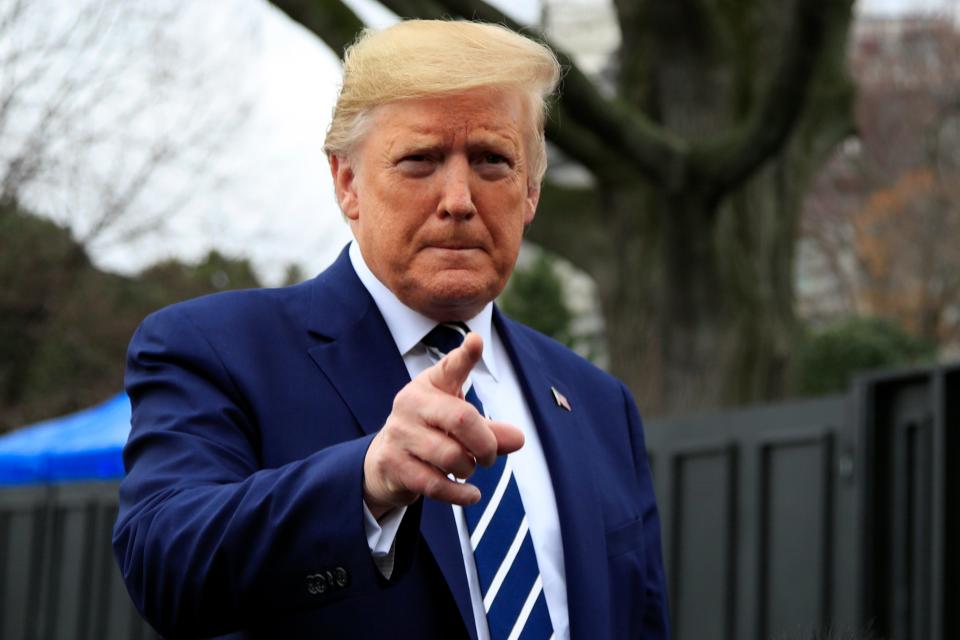Donald Trump floats payroll tax cut, other financial relief for businesses and workers as coronavirus spreads
WASHINGTON – President Donald Trump said Monday he will seek financial relief for workers and businesses hurt by coronavirus, as new cases were reported across the country and U.S. stocks suffered their worst drop since 2008.
Trump said he would be proposing "very major" and "very dramatic" measures but did not say specifically what they would be. He said his administration will meet Tuesday with House and Senate leaders to discuss an economic stimulus package that could include a possible payroll tax cut and relief for hourly wage earners to ensure that they won't have to miss a paycheck.
“The main thing here is we are taking care of the American public," Trump said at a White House news conference following a coronavirus task force meeting. “And we’re taking care of the American economy.”
Trump said his administration will be creating loans for small businesses and working with industries such as airlines and cruise ships that have been harmed by the coronavirus scare. In addition, the White House has invited Wall Street executives to meet with Trump later this week on how to cope with the coronavirus threat.
Trump’s decision to push for a stimulus package represented a departure for the White House, which has insisted that the fundamentals of the economy are solid and that the coronavirus would cause only a short-term blip in growth.
But the coronavirus threat continues to rattle financial markets. U.S. stocks collapsed on Monday, with the Dow Jones industrial average plummeting by more than 2,000 points for its worst day since 2008 after a free fall in oil prices and a growing number of coronavirus cases.
Total coronavirus cases around the globe surpassed 111,000 on Monday, with confirmed U.S. cases exceeding 600. The worldwide death toll approached 4,000 and rose to 26 in the U.S.

Last Friday, Trump signed an $8.3 billion package of emergency funding to help treat and slow the spread of the virus. The package includes funding for research and development of vaccines as well as money for prevention, preparedness and response.
Treasury Secretary Steven Mnuchin, who appeared alongside Trump at Monday's news conference, said the U.S. has "the most resilient economy in the world."
But, "there are parts of the economy that are going to be impacted, especially workers that need to be at home, hard-working people who are at home under quarantine and are taking care of their family," he said. "We'll be working on a program to address that."
Mnuchin said Trump is committed to providing "whatever support we need" to help the economy.
Trump’s senior economic adviser, Larry Kudlow, first floated the possibility of providing financial relief to businesses and workers last week as widening concerns over the virus prompted tech companies, musicians, sports teams and international institutions to cancel dozens of events being held around the globe.
Kudlow suggested a stimulus package would be targeted at industries such as travel and hospitality companies most impacted.
Economic impact: 4 ways to invest when interest rates are plunging on coronavirus worries
On Capitol Hill, Sen. Chuck Grassley, the Republican chairman of the Senate Finance Committee, also has begun exploring the possibility of a stimulus package.
“While we continue to assess the economic impacts, Chairman Grassley is exploring the possibility of targeted tax relief measures that could provide a timely and effective response to the coronavirus,” said Grassley’s spokesman, Michael Zona. “Several options within the committee’s jurisdiction are being considered as we learn more about the effects on specific industries and the overall economy.”
Some economists are recommending broader steps Congress can take in the short term to aid those immediately affected by the virus, such as defraying the health care costs of those infected and reducing the Social Security payroll tax for all workers.
A cut in the payroll tax for all workers from 6.2% to 4.2% – similar to the decrease during the Obama administration – would boost household income by $150 billion, says Barclays economist Michael Gapen. That, he says, would help prop up consumer spending and increasing gross domestic product by 0.4% to 0.6%, he says.
But Jared Bernstein, an economic adviser to then-Vice President Joe Biden and a senior fellow with the Center on Budget and Policy Priorities, questions whether a payroll tax cut would be effective.
"A temporary cut in the payroll tax can help workers who are still drawing a paycheck, but if you're idled due to the virus and don't have paid leave, it doesn't help you," he said.
Economist Adam Slater of Oxford Economics recommends expanding paid sick leave to workers not normally covered, including the self-employed.
Sen. Patty Murray, D-Wash., and Rep. Rosa DeLauro, D-Conn., filed legislation last week that would require all employers to provide workers with 14 days of paid sick leave during any public health emergency, including the current coronavirus threat. The bill also would allow workers to accrue seven days of paid sick leave for other health matters.
Contributing: Paul Davidson
Coronavirus panic: A $100,000 cleaning machine? A 'silver bullet' disinfectant? Businesses cash in on coronavirus panic at schools
This article originally appeared on USA TODAY: Coronavirus: Donald Trump pushes economic stimulus as disease spreads

